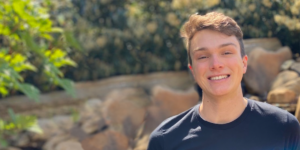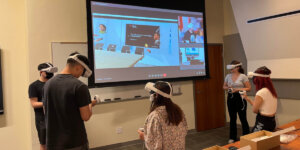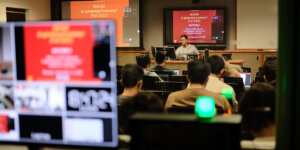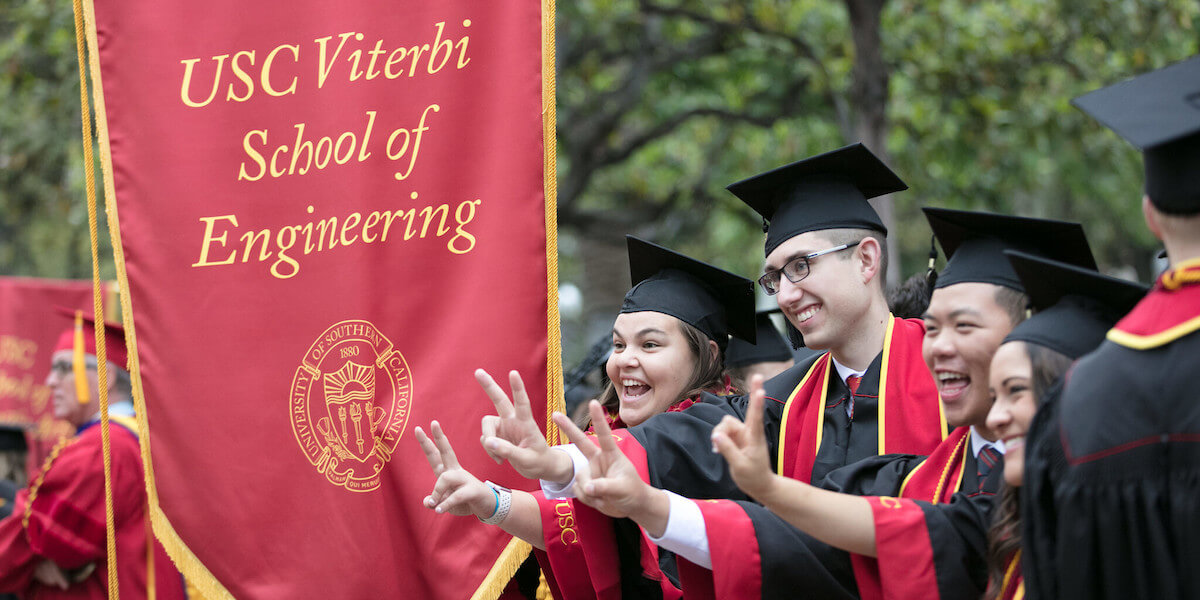
An expansion of the Engineering Writing Program (EWP), the new Engineering in Society Program’s mission is to distinguish a USC Viterbi engineering education by connecting a student’s discipline with its societal impact across their undergraduate education. (Photo/Victor Leung)
In a cavernous lecture hall at USC, students unpack their laptops, plug in, and lean forward in anticipation. Professor Elisa Warford asks the assembled whether people could have a meaningful romantic relationship with an AI-powered robot, one capable of learning and mimicking human behavior, even emotions.
“I don’t think so. The relationship would not be reciprocal because robots cannot enter into it with free will,” one student says.
“What if somebody behaves violently against their robotic partner?” another student asks. “This kind of behavior could bleed into society, which would be highly problematic.”
Warford takes this all in. Finally, she speaks: “The idea of buying or owning your partner may be problematic,” she says. “Also, what kind of society would we be living in if people paired off with robots? It would be so isolating.”
A typical college philosophy class? Well, not exactly. Warford, a USC Viterbi associate professor of technical communication practice, co-teaches “Philosophy/Engineering 265: Ethics, Technology and Value” with USC Dornsife Department of Philosophy Professor Jacob Ross. The new joint philosophy/engineering class is part of the recently unveiled Engineering in Society Program.
The Engineering in Society Program: Trustworthy Engineers
An expansion of the Engineering Writing Program (EWP), the new program’s mission is to distinguish a USC Viterbi engineering education by connecting a student’s discipline with its societal impact across their undergraduate education, anchored in courses available to all students and in extra-curricular opportunities. The program also embraces a holistic approach to engineering education – grounded in the liberal arts, taught through innovative practice, cultivating character as an inherent ingredient to engineering education, integrated with USC Viterbi’s strong technical curriculum.
“We should be preparing students not only with outstanding technical competence, but also with character, which together with competence spells trust,” USC Viterbi Dean Yannis C. Yortsos said. “USC Viterbi aspires to create a model engineering education that accompanies outstanding technical competence with outstanding character, thus leading to the creation of trust, sorely needed in today’s world.”
Specifically, the Engineering in Society Program focuses on communication skills (for undergraduates and graduates), ethics (through courses, modules, and extra curriculars), and engineering education (through teaching and research).
“Today’s engineers require more than technical skills,” Yortsos added. “They need to understand and consider the interests of the communities affected by engineering practice; a strong knowledge of ethical responsibilities in view of the rapid and powerful changes in technology; a deep understanding of themselves and their place in society; and they must be able to articulate their ideas to those they impact.”
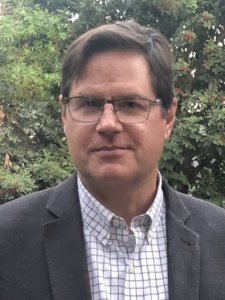
Steve Bucher, director of the Engineering in Society Program (Photo/Kirsten Moreno)
Said Steve Bucher, the new program’s director: “Our goal is to better emphasize the humanistic aspects of an engineering education in our students’ experiences. So, we’re leveraging the strengths of USC Viterbi, Engineering +, and the Engineering Writing Program to complement Viterbi’s technical coursework and provide unique learning opportunities for our students.”
Changing the conversation
In the words of Yortsos, USC Viterbi is committed to removing old stereotypes about engineering (“who we are, what we do and what we look like”) and, in the process, changing the conversation about engineering.
That vision has led USC Viterbi to become a national leader in the Grand Challenges Scholars Program, co-founded at USC in 2009 and which recently received the 2022 Gordon Prize of the National Academy of Engineering. It has also led USC Viterbi to be a champion of diversity, equity and inclusion, and in the process receive the 2017 ASEE President’s Award. The school has also played an integral role in leveraging engineering to fight Covid-19, helping to change perceptions about the power of engineering as a force for social good.
Now, USC Viterbi wants to change the conversation about engineering education.
After a year and a half of planning, USC Viterbi recently launched the Engineering in Society Program. The academic program is developing several initiatives that build upon innovations embedded in the EWP’s main course offering, Writing 340, Advanced Communication for Engineers, which includes communication skills, ethics, service learning, and even theatre improvisation.
Another key component of the new program is the Viterbi Ethos Project, the first phase of which is partially funded by the Coalition for Life Transformative Education.
The Ethos Project seeks to develop engineering students’ character, identity, and purpose. Its current phase includes a re-imagined Freshman Academy in which students design a product that addresses a pressing societal need; student-generated engineering podcasts; presentations by USC Viterbi students to local 6 – 12 schools; and organized student-led discussions about topics in engineering. Subsequent phases will continue to address skills and characteristics to build trustworthy engineers.
The Engineering in Society Program aims to “infuse humanitarian values in our undergraduate students,” said Gisele Ragusa, professor of engineering education and co-creator of the Freshman Academy Renovation, the re-imagined Freshman Academy class. “We’ve built this so that students will have various touchpoints during their time here that will provide them with character development.”
The following represent some of the new and soon-to-be launched offerings in the newly christened Engineering in Society Program:
“Philosophy/Engineering 265: Ethics, Technology and Value”
This co-taught semester-long engineering/philosophy course encourages students to think critically about the interrelationships between technology and society; identify ethical issues related to the development and implementation of technology; and understand and engage with a range of moral theories and philosophical concepts.
Warford, a co-architect of the new cross-listed class, along with philosophy professors Ross and Jake Nebel, said she hopes it will provide engineering and other students a framework with which to make better decisions in their careers.
“If they’re coding for Apple or Google, they’re going to have to make all kinds of choices about the algorithms going into AI. For instance, how much data should an app gather? How long should that data to be stored? Is it secure?”
“So, the goal,” added Warford, “is for them not to only think of instrumental and economic values but to also think about ethical ones. Technology isn’t always value neutral.”
Warford, Ross and Nebel received an interdisciplinary grant to develop the class.
Freshman Academy Renovation
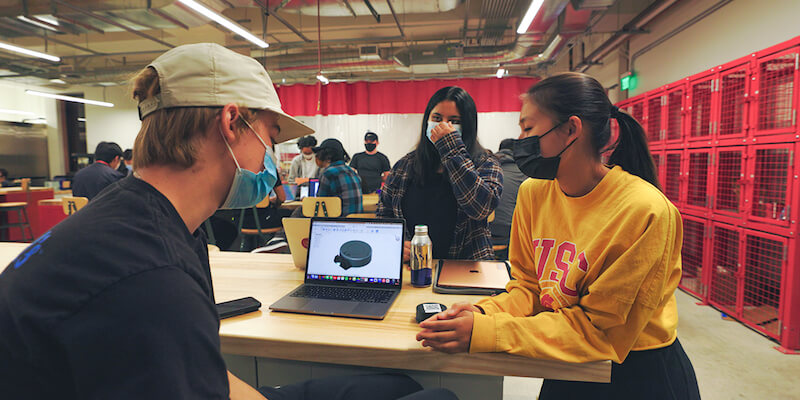
USC students working on team projects in the Baum Family Maker Space in USC Viterbi’s Freshman Academy Renovation class (Photo/Daniel Ragussis)
A major reworking of USC Viterbi’s Freshman Academy class, the Freshman Academy Renovation, Engineering 102, focuses on how students can ethically use human-centered design, or design tailored to best meet people’s needs, to solve important societal problems with engineering.
In the course, participating students break into teams of three to five to come up with an idea based on the National Academy of Engineering Grand Challenges or the United Nations’ Sustainable Development Goals; receive feedback from classmates; and, in conjunction with faculty and upper-division student mentors, or “coaches,” build their project prototypes in the Baum Family Maker Space with 3-D printers and other leading-edge technologies. The semester ends with student reports and oral presentations.
“Along the way, they read case studies from the National Society of Professional Engineers and engage in an iterative analysis at the intersection of engineering and ethics,” said Ragusa, the engineering education professor who co-designed the course renovation with Erik Johnson, USC Viterbi’s vice dean for academic programs.
In the reworked academy’s 2020 pilot class, for instance, one student group developed recycled plastic brick building materials that could substantially lower the cost of building housing for under-resourced neighborhoods and those experiencing homelessness. Another cohort created a small straw that an individual could use to ascertain whether somebody had drugged their drink during a social gathering, which could ward off potential sexual assault.
“Engineering Moment”
An initiative to encourage the production of engineering-related podcasts by USC Viterbi students, “Engineering Moment” will “create a community space for engineering students to share, inspire and challenge each other about their social responsibilities,” said Harly Ramsey, an associate professor of technical communication practice.
Ramsey, the creator of “Engineering Moment,” is no stranger to podcasts. Over the past three years, students in her Writing 340 section have created more than 100 of them under her direction. Topics have ranged from sustainable cities to Women in STEM.
“The process of creating podcasts raises students’ awareness that they have this tremendous knowledge, and how they leverage and apply it will affect our future,” Ramsey said.
Engineers Engaging Community
Engineers Engaging Community will help USC Viterbi students hone their communication skills by speaking on engineering-related subjects to Los Angeles 6-12 schools.
The initiative, which is expected to launch in spring 2022, will give interested USC Viterbi students 10 to 15 minutes to talk about subjects of interest to them, including engineering ethics and theory.
USC Viterbi and local elementary, middle and high school students will equally profit from the lectures, which will also include time for audience queries, said Martha Townsend, an associate professor of technical communication practice.
“The benefit for our students is they will have the opportunity to practice communicating and fielding questions from diverse audiences,” Townsend said. “For the younger students, they’ll be exposed to something they might not know about. More important, our Viterbi students might inspire an interest in STEM through their role modeling.”
The Good Life Discussion Series
This extra-curricular project aims to cultivate reason and virtue in USC Viterbi students through deep discussion of science and engineering, said Townsend, the initiative’s creator. She hopes to launch this initiative in the late spring, assuming pandemic metrics improve by then.
Initially, Townsend said she expects groups of no more than 20 to gather to discuss ethical issues, which USC Viterbi students already explore in their advanced writing classes. Later, groups could broach other topics, Townsend added. Graduate students would moderate all sessions, which could launch by the end of the semester.
Said Townsend: “My intention is fostering a real discussion with no right or wrong answers, no points attached, no association with course work, just a discussion for the liveliness and the intellectual engagement of the discussion itself.”
Published on January 10th, 2022
Last updated on May 16th, 2023




